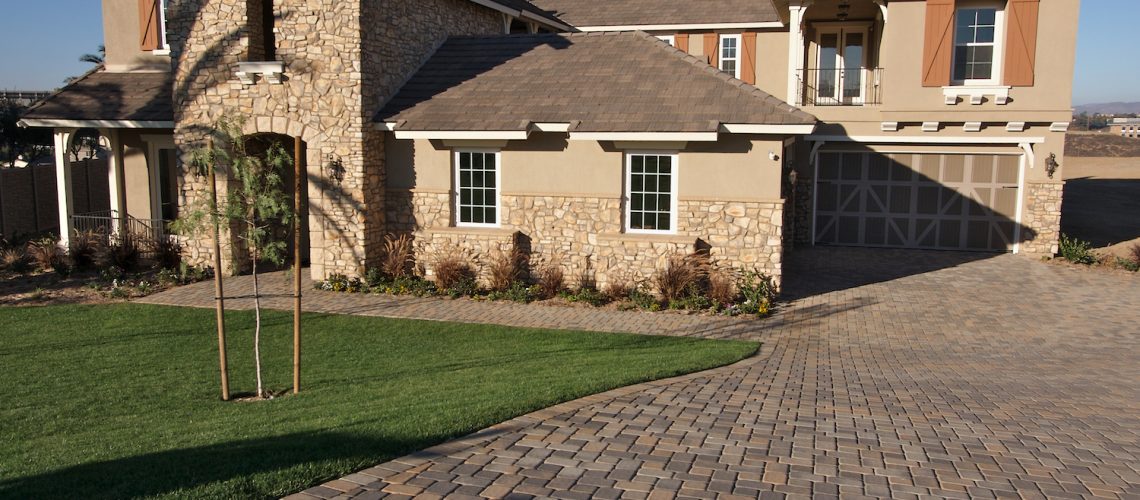The choice of materials for your driveway is a crucial decision that not only impacts the aesthetics of your home but also influences its functionality and long-term value. Two popular options for driveways are pavers and concrete, each offering distinct advantages and drawbacks.
In this article, we will explore the key factors to consider when deciding between a paver and concrete home driveway, helping you make an informed decision that aligns with your preferences, budget, and long-term goals.
Paver Durability and Longevity
One of the primary considerations when investing in a driveway is its durability and longevity. Both pavers and concrete are known for their robustness, but they differ in certain aspects. Concrete driveways are renowned for their strength and durability, capable of withstanding heavy loads and enduring harsh weather conditions. Properly installed and maintained concrete driveways can last for several decades.
On the other hand, paver driveways offer a unique advantage in terms of flexibility. Pavers are individual units that interlock, allowing for movement without cracking. This flexibility makes them ideal for regions with volatile weather patterns, as pavers can adjust to ground movement. While concrete is prone to cracking under extreme conditions, pavers can shift slightly, reducing the risk of damage.
Paver Aesthetic Appeal
The aesthetic appeal of your driveway significantly contributes to the overall look of your home. Concrete driveways are available in a variety of finishes, including brushed, stamped, and exposed aggregate. These options allow homeowners to customize the appearance of their driveways to complement the architectural style of their homes. Concrete driveways also provide a clean and contemporary look, enhancing curb appeal.
Pavers, however, take the aesthetic customization to the next level. With an extensive array of colors, shapes, and patterns, pavers offer a more versatile and visually appealing option. Homeowners can create intricate designs, such as herringbone or basket weave patterns, to add a touch of elegance to their driveways. The individuality of each paver allows for a unique and personalized look that can enhance the overall aesthetic of the property.
Paver Installation Process and Time
The installation process and time required for both paver and concrete driveways differ significantly. Concrete driveways are typically faster to install than pavers since they involve pouring concrete into forms and allowing it to cure. However, the curing time can be a drawback, as it may take several days for the concrete to fully set before the driveway can be used. Additionally, the pouring and finishing process requires skilled professionals to ensure a smooth and even surface.
Paver driveways, on the other hand, involve a more intricate installation process. Each paver unit must be individually placed and secured, which can be time-consuming. The installation time for pavers can be influenced by factors such as the complexity of the design and the skill of the installer. While the process may take longer than concrete, the advantage lies in the ability to use the driveway immediately after installation, as there is no curing time required.
Concrete Driveways Maintenance and Repairs
Maintenance is a crucial factor in determining the long-term cost of a driveway. Concrete driveways generally require less maintenance than pavers. A periodic sealing of the concrete surface helps protect it from stains, cracks, and the effects of weathering. However, if cracks do occur, repairing concrete can be more challenging. Cracks may need to be filled with specialized materials, and achieving a seamless repair can be difficult.
Paver driveways, while more maintenance-intensive, offer a distinct advantage in terms of repairs. If a paver becomes damaged, it can be easily replaced without affecting the surrounding units. This modular aspect of pavers simplifies maintenance and allows homeowners to address issues promptly, preventing further damage. Regular maintenance for paver driveways involves re-sanding the joints to ensure stability and preventing weed growth.
Paver Cost Considerations
Cost is a significant factor for many homeowners when choosing between pavers and concrete for their driveways. Concrete driveways are generally more cost-effective in terms of initial installation. The materials are relatively inexpensive, and the straightforward installation process contributes to lower labor costs. This makes concrete driveways an attractive option for those on a tight budget.
Paver driveways, on the other hand, tend to have a higher upfront cost. The materials themselves are more expensive, and the installation process requires more labor and expertise. However, it’s essential to consider the long-term costs and benefits. While pavers may have a higher initial investment, their durability and ease of repair can result in lower maintenance costs over the lifespan of the driveway.
Environmental Considerations
As environmental consciousness becomes increasingly important, homeowners may consider the ecological impact of their driveway choice. Concrete is made from readily available materials, such as limestone, clay, and sand. The production process, while energy-intensive, has improved in terms of environmental impact in recent years. Additionally, concrete reflects light, reducing the heat island effect in urban areas.
Pavers, being individual units, often allow for better water drainage, reducing runoff and promoting groundwater recharge. The production of pavers typically involves less energy than concrete, as it requires less heat during manufacturing. Additionally, the ability to reuse and recycle pavers makes them an environmentally friendly option. Homeowners looking to minimize their ecological footprint may find pavers a more sustainable choice.
Paver Climate Resilience
The local climate plays a crucial role in the durability of driveways. In regions with extreme temperature variations, such as freeze-thaw cycles, the choice between pavers and concrete becomes more nuanced. Concrete, being susceptible to cracking in such conditions, may require additional measures like reinforced mesh or fiber to mitigate potential damage. Pavers, with their ability to flex and adjust, are often considered more resilient in areas with unpredictable weather patterns. Homeowners in climates prone to temperature extremes should carefully evaluate the impact of weather on their driveway material of choice.
Property Value and Curb Appeal
Beyond personal preferences, the impact of your driveway choice on property value should be taken into account. While a well-maintained concrete driveway can enhance curb appeal, the intricate designs and patterns achievable with pavers can elevate a home’s overall aesthetic, potentially increasing its market value. The durability and visual appeal of your driveway can be a selling point, especially in real estate markets where these features are highly valued.
DIY Paver Installation and Repairs
For the avid do-it-yourselfer, the feasibility of installation and repairs is a crucial factor. Concrete driveways, with their simpler installation process, might be more suitable for DIY projects. However, it’s essential to note that working with concrete requires precision to achieve a smooth, even surface. Paver driveways, while more complex to install, may be more forgiving for DIY enthusiasts due to their modular nature. Homeowners with a hands-on approach to home improvement might find the flexibility of pavers appealing for both installation and minor repairs.
Neighborhood Regulations and Aesthetics
Local regulations and neighborhood aesthetics should not be overlooked when deciding on a driveway material. Some homeowner associations or local authorities may have restrictions on the types of driveways allowed. It’s crucial to ensure that your chosen material aligns with these regulations. Additionally, considering the overall aesthetic of your neighborhood can help maintain a cohesive look. While personal expression is essential, a driveway that complements the architectural style of the area contributes to a harmonious community aesthetic.
Future Paver Expansion and Modifications
Homeowners with long-term plans for their property may also want to consider future modifications and expansions. If there’s a possibility of adding features like additional parking space or pathways, the modular nature of pavers could simplify these modifications. Concrete, being a monolithic structure, may require more intricate adjustments and could be costlier in such scenarios. Planning for potential future changes can save both time and money down the road.
Conclusion
In the nuanced decision-making process of choosing between a paver and concrete driveway, it’s crucial to weigh these extended considerations. Climate resilience, property value, DIY potential, local regulations, and future plans all contribute to the overall equation. A well-informed decision considers not only the immediate benefits but also the long-term implications. By carefully evaluating these factors, homeowners can confidently choose the driveway material that best aligns with their lifestyle, aesthetic preferences, and future goals.

